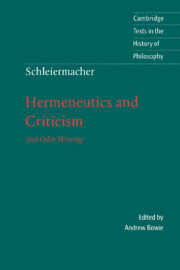Introduction
Published online by Cambridge University Press: 05 June 2012
Summary
Hermeneutics, the ‘art of interpretation’, has moved in recent years in the English-speaking world from being regarded as a subsidiary aspect of European philosophy to being one of the most widely debated topics in contemporary philosophy. Almost every account of the history of modern hermeneutics pays some kind of tribute to the founding role played by the German Protestant theologian and philosopher Friedrich Daniel Ernst Schleiermacher (1768–1834). The tribute is, though, usually significantly double-edged: very many of these accounts reiterate the conception of Schleiermacher as the ‘Romantic’ theorist who thinks of interpretation as an ‘intuitive’, ‘empathetic’ identification with the thoughts and feelings of the author of a text. This has often led to his being written off as part of the history of psychologistic textual interpretation that has been discredited by approaches to language and meaning in existential hermeneutics, analytical semantics, and structuralism and post-structuralism. However, as the texts translated here demonstrate, Schleiermacher never in fact saw interpretation in empathetic terms, seeing it rather in terms that now sound surprisingly relevant to contemporary philosophical accounts of language and epistemology.
Understanding Schleiermacher's hermeneutics is, though, made difficult by the fact that there are hardly any texts by Schleiermacher that exist in a version of which he would finally have approved: the work on hermeneutics in the present volume, for example, dates from as early as 1805 as late as 1833, although the underlying conceptual framework does not change as much as some commentators have suggested.
- Type
- Chapter
- Information
- Schleiermacher: Hermeneutics and CriticismAnd Other Writings, pp. vii - xxxiPublisher: Cambridge University PressPrint publication year: 1998

